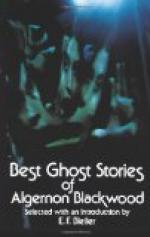“What?” said Dear Jones, sitting up suddenly. “You don’t mean to tell me that the ghost which haunted the house was a woman?”
“Those were the very words Eliphalet Duncan used,” said Uncle Larry; “but he did not need to wait for the answer. All at once he recalled the traditions about the domiciliary ghost, and he knew that what the titular ghost said was the fact. He had never thought of the sex of a spook, but there was no doubt whatever that the house ghost was a woman. No sooner was this firmly fixed in Eliphalet’s mind than he saw his way out of the difficulty. The ghosts must be married!—for then there would be no more interference, no more quarreling, no more manifestations and materializations, no more dark seances, with their raps and bells and tambourines and banjos. At first the ghosts would not hear of it. The voice in the corner declared that the Duncan wraith had never thought of matrimony. But Eliphalet argued with them, and pleaded and persuaded and coaxed, and dwelt on the advantages of matrimony. He had to confess, of course, that he did not know how to get a clergyman to marry them; but the voice from the corner gravely told him that there need be no difficulty in regard to that, as there was no lack of spiritual chaplains. Then, for the first time, the house ghost spoke, in a low, clear, gentle voice, and with a quaint, old-fashioned New England accent, which contrasted sharply with the broad Scotch speech of the family ghost. She said that Eliphalet Duncan seemed to have forgotten that she was married.




